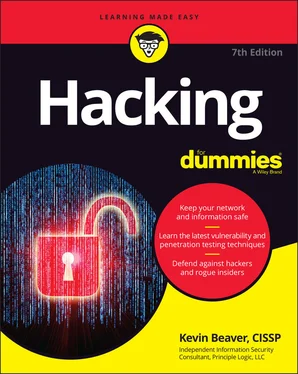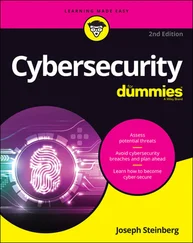Kevin Beaver - Hacking For Dummies
Здесь есть возможность читать онлайн «Kevin Beaver - Hacking For Dummies» — ознакомительный отрывок электронной книги совершенно бесплатно, а после прочтения отрывка купить полную версию. В некоторых случаях можно слушать аудио, скачать через торрент в формате fb2 и присутствует краткое содержание. Жанр: unrecognised, на английском языке. Описание произведения, (предисловие) а так же отзывы посетителей доступны на портале библиотеки ЛибКат.
- Название:Hacking For Dummies
- Автор:
- Жанр:
- Год:неизвестен
- ISBN:нет данных
- Рейтинг книги:3 / 5. Голосов: 1
-
Избранное:Добавить в избранное
- Отзывы:
-
Ваша оценка:
- 60
- 1
- 2
- 3
- 4
- 5
Hacking For Dummies: краткое содержание, описание и аннотация
Предлагаем к чтению аннотацию, описание, краткое содержание или предисловие (зависит от того, что написал сам автор книги «Hacking For Dummies»). Если вы не нашли необходимую информацию о книге — напишите в комментариях, мы постараемся отыскать её.
Hacking For Dummies
Hacking For Dummies
Hacking For Dummies — читать онлайн ознакомительный отрывок
Ниже представлен текст книги, разбитый по страницам. Система сохранения места последней прочитанной страницы, позволяет с удобством читать онлайн бесплатно книгу «Hacking For Dummies», без необходимости каждый раз заново искать на чём Вы остановились. Поставьте закладку, и сможете в любой момент перейти на страницу, на которой закончили чтение.
Интервал:
Закладка:
 Recognizing what endangers your computer systems
Recognizing what endangers your computer systems
 Starting to use the process for security testing
Starting to use the process for security testing
This book is about testing your computers and networks for security vulnerabilities and plugging the holes you find before the bad guys get a chance to exploit them.
Straightening Out the Terminology
Everyone has heard of hackers and malicious users. Many people have even suffered the consequences of their criminal actions. Who are these people, and why do you need to know about them? The next few sections give you the lowdown on these attackers.
 In this book, I use the following terminology:
In this book, I use the following terminology:
Hackers (or external attackers) try to compromise computers, sensitive information, and even entire networks for ill-gotten gains — usually from the outside — as unauthorized users. Hackers go for almost any system they think they can compromise. Some prefer prestigious, well-protected systems, but hacking into anyone’s system increases an attacker’s status in hacker circles.
Malicious users ( external or internal attackers, often called black-hat hackers) try to compromise computers and sensitive information from the outside (such as customers or business partners) or the inside as authorized and trusted users. Malicious users go for systems that they believe they can compromise for ill-gotten gains or revenge, because they may have access or knowledge of a system that gives them a leg up.Malicious attackers are, generally speaking, both hackers and malicious users. For the sake of simplicity, I refer to both as hackers and specify hacker or malicious user only when I need to differentiate and drill down further into their unique tools, techniques, and ways of thinking.
Ethical hackers (or good guys), often referred to as white-hat hackers or penetration testers, hack systems to discover vulnerabilities to protect against unauthorized access, abuse, and misuse. Information security researchers, consultants, and internal staff fall into this category.
Hacker
Hacker has two meanings:
Traditionally, hackers like to tinker with software or electronic systems. Hackers enjoy exploring and learning how computer systems operate. They love discovering new ways to work — both mechanically and electronically.
Over the years, hacker has taken on a new meaning: someone who maliciously breaks into systems for personal gain. Technically, these criminals are crackers (criminal hackers). These “crackers” break into — or crack — systems with malicious intent. They seek fame, intellectual property, profit, or even revenge. They modify, delete, and steal critical information, and they spread ransomware and take entire networks offline, often bringing large corporations and government agencies to their knees. Don’t get me started on how pop culture and the media have hijacked the word hack , from life hacking to so-called election meddling. Marketers, politicians, and media strategists know that the average person doesn’t understand the term hacking, so many of them use it however they desire to achieve their goals. Don’t be distracted.
The good-guy (white-hat) hackers don’t like being lumped in the same category as the bad-guy (black-hat) hackers. (In case you’re curious, the white hat and black hat come from old Western TV shows in which the good guys wore white cowboy hats and the bad guys wore black cowboy hats.) Gray-hat hackers are a bit of both. Whatever the case, the word hacker often has a negative connotation .
Many malicious hackers claim that they don’t cause damage but help others for the greater good of society. Yeah, whatever. Malicious hackers are electronic miscreants and deserve the consequences of their actions.
Be careful not to confuse criminal hackers with security researchers. Researchers not only hack aboveboard and develop the amazing tools that we get to use in our work, but they also (usually) take responsible steps to disclose their findings and publish their code. Unfortunately, there is a war going on against legitimate information security research, and the tools and techniques are often questioned by government agencies. Some people are even forced to remove these tools from their websites.
Malicious user
A malicious user — meaning a rogue employee, contractor, intern, or other user who abuses their trusted privileges — is a common term in security circles and in headlines about information breaches. The issue isn’t necessarily users hacking internal systems but users who abuse the computer access privileges they’ve been given. Users ferret through critical database systems to glean sensitive information, email confidential client information to the competition or elsewhere to the cloud to save for later, or delete sensitive files from servers that they probably didn’t need to have access to in the first place.
Sometimes, an innocent (or ignorant) insider whose intent isn’t malicious still causes security problems by moving, deleting, or corrupting sensitive information. Even an innocent fat finger on the keyboard can have dire consequences in the business world. Think about all the ransomware infections affecting businesses around the world. All it takes is one click by a careless user for your entire network to be affected.
Malicious users are often the worst enemies of IT and information security professionals because they know exactly where to go to get the goods and don’t need to be computer-savvy to compromise sensitive information. These users have the access they need, and management trusts them — often without question.
Recognizing How Malicious Attackers Beget Ethical Hackers
You need protection from hacker shenanigans. Along the lines of what my father taught me about being smarter than the machine you’re working on, you have to become as savvy as the guys who are trying to attack your systems. A true IT or security professional possesses the skills, mindset, and tools of a hacker but is trustworthy. They perform hacks as security tests against systems based on how hackers think and work and make tireless efforts to protect the organizations’ network and information assets.
 Ethical hacking (otherwise known as vulnerability and penetration testing) involves the same tools, tricks, and techniques that criminal hackers use, with one major difference: It’s performed with the target’s permission in a professional setting. The intent of this testing is to discover vulnerabilities from a malicious attacker’s viewpoint to better secure systems. Vulnerability and penetration testing is part of an overall information risk management program that allows for ongoing security improvements. This security testing can also ensure that vendors’ claims about the security of their products are legitimate.
Ethical hacking (otherwise known as vulnerability and penetration testing) involves the same tools, tricks, and techniques that criminal hackers use, with one major difference: It’s performed with the target’s permission in a professional setting. The intent of this testing is to discover vulnerabilities from a malicious attacker’s viewpoint to better secure systems. Vulnerability and penetration testing is part of an overall information risk management program that allows for ongoing security improvements. This security testing can also ensure that vendors’ claims about the security of their products are legitimate.
SECURITY TESTING CERTIFICATIONS
If you perform vulnerability and penetration tests and want to add another certification to your credentials, you may want to consider becoming a Certified Ethical Hacker (C|EH) through a certification program by EC-Council. See www.eccouncil.org for more information. Like Certified Information Systems Security Professional (CISSP), the C|EH certification is a well-known, respected certification in the industry, accredited by the American National Standards Institute (ANSI 17024).
Интервал:
Закладка:
Похожие книги на «Hacking For Dummies»
Представляем Вашему вниманию похожие книги на «Hacking For Dummies» списком для выбора. Мы отобрали схожую по названию и смыслу литературу в надежде предоставить читателям больше вариантов отыскать новые, интересные, ещё непрочитанные произведения.
Обсуждение, отзывы о книге «Hacking For Dummies» и просто собственные мнения читателей. Оставьте ваши комментарии, напишите, что Вы думаете о произведении, его смысле или главных героях. Укажите что конкретно понравилось, а что нет, и почему Вы так считаете.












